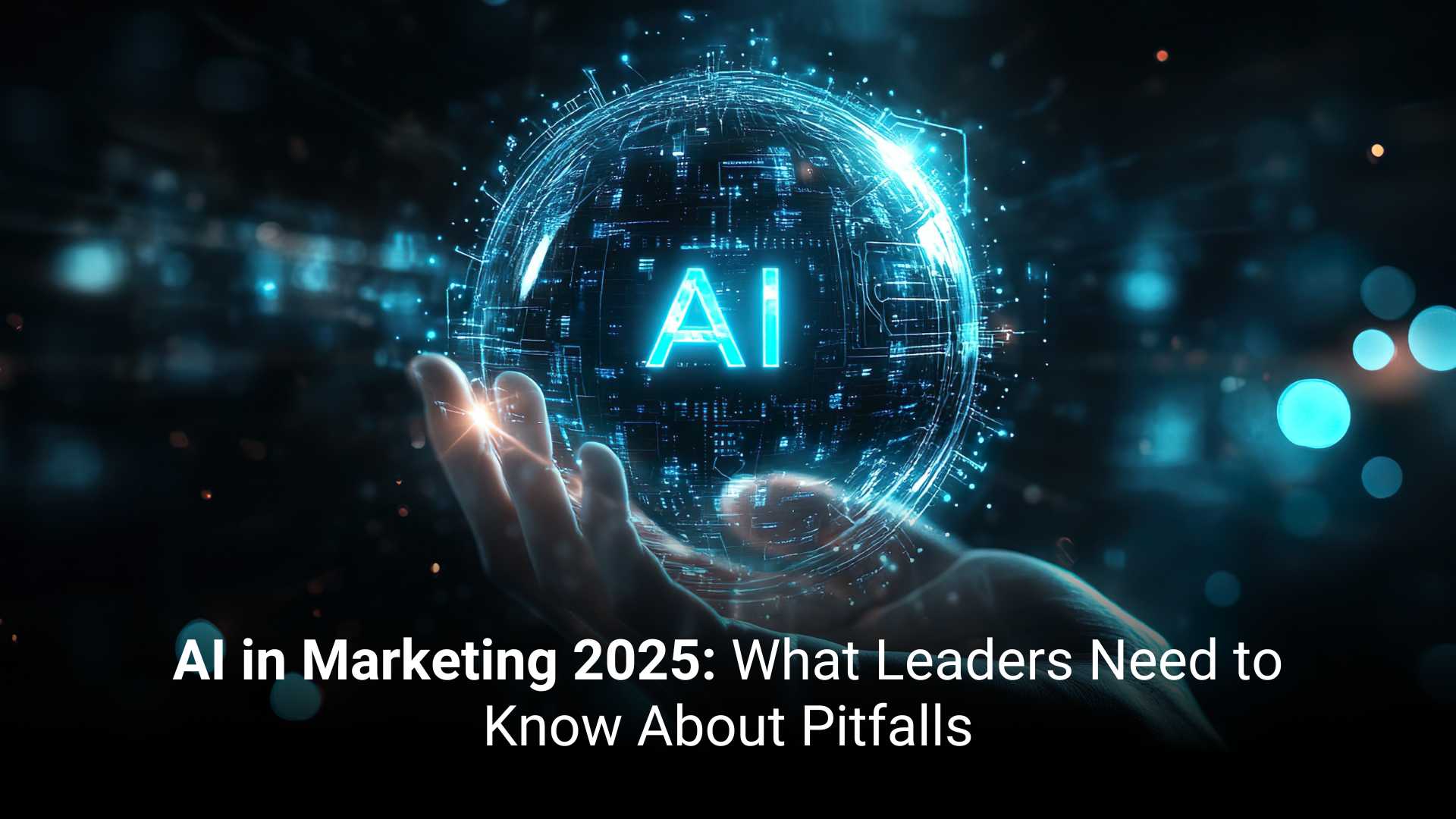
AI in Marketing 2025: What Leaders Need to Know About Pitfalls
A global brand launches a new AI-powered campaign designed to personalize every customer touchpoint. At first, the results look promising, but within weeks, issues begin to surface. Customers complain about invasive targeting, red flags about data usage, and reputational damage. The innovative leap becomes an overlooked risk of AI in marketing.
The danger lies in the illusion of efficiency. AI systems can crunch data, generate content, and predict consumer behavior. But without oversight, they can deliver flawed insights, alienate audiences, or expose legal risks. For example, an AI tool that misinterprets cultural nuances in global markets could trigger campaigns leading to backlash.
This article will discuss the pitfalls of AI in marketing and why it is essential for marketers.
The AI Hype Trap: Why “Smarter” Tools Don’t Always Deliver Better Marketing Outcomes
Success comes from clear strategy, quality data, and human judgment, then using AI tools to scale what already works.
1. AI Tools Amplify Strategy, Good or Bad
Most teams are convinced that by leveraging more AI, they can naturally attain better marketing outcomes. The truth is that AI continues to amplify what strategy a team already has in place. For instance, if they are not precise in their goal or messaging, AI can simply amplify this. A SaaS business that uses email technology can, for instance, personalize more efficiently, yet if the message is not compelling, they can’t raise the click-through.
2. Misaligned Metrics Distort Outcomes
Generally, most of these tools are optimized for click-throughs, open rates, or engagement because it is often easiest to track. But a successful strategy is really dependent on pipeline and deal impact. A mere dashboard based on pretty charts can look good, but results will be disappointing if it is optimized for non-strategic results.
3. Lack of Supervision by Humans Leads to Blind Spots
AI lacks business understanding or knowledge. It follows that if tools don’t have human oversight, then they value efficiency above all else, even above experience. The brand that lets its AI fully automate its creativity decisions could unintentionally water down its brand voice or violate messaging guidelines.
4. Tool Sprawl Creates Complexity, Not Performance
Stacking multiple AI tools without integration increases operational complexity. Teams spend more time managing tools than improving outcomes.
5. More Automation Doesn’t Equal More Relevance
AI tools often promise hyper-personalization, but without quality data and context, automation creates noise. Buyers quickly disengage from messages that feel automated rather than relevant. A marketing team that deploys AI chatbots without clear buyer journeys may increase interactions while reducing trust.
AI Without Strategy: The Cost of Automating Broken Marketing Processes
AI doesn’t repair broken marketing, it accelerates it. Those that don’t pay the price in wasted spend and eroded trust.
1. Broken Data Pipelines Lead to Misled AI Decisions
AI-driven marketing relies on clean, connected data. When CRM, marketing automation, and sales systems are misaligned, AI optimizes based on incomplete signals. An enterprise may deploy AI for campaign optimization but if the opportunity data isn't fed back into the system, AI can't learn what actually drives revenue.
2. Automation Amplifies Inefficiency Rather Than Correcting It
AI technologies promise speed and scale, but applied to flawed marketing processes, they simply automate inefficiency. In marketing, this often means faster execution of the wrong activities. For example, a company using AI to automate lead outreach without fixing poor targeting may increase email volume while response rates continue to drop.
3. Lack of Context Results in Poor Customer Experience by AI
Pivotal interactions that are AI-driven feel disjointed without a clear buyer journey. Conflicting messages across channels may be received by prospects. For instance, a buyer researching early-stage content suddenly gets aggressive sales messaging triggered by shallow engagement signals that damage trust.
Measurement Blind Spots: Why AI Optimization Can Hide What Really Drives Revenue
AI optimization doesn’t reveal truth; it reflects measurement choices. Teams that expand what they measure uncover what really drives revenue, not just what’s easy to optimize.
1. AI Optimizes What You Tell It to Measure
AI marketing tools are good at optimizing toward defined goals. The problem is that many teams set goals around short-term engagement because they’re easy to track. When AI is trained on these signals, it amplifies activity that looks successful on dashboards but may have little impact on revenue. For example, an AI tool may prioritize click-heavy content that attracts curious researchers rather than buyers with real purchase intent.
2. Short Feedback Loops Distort Long Sales Cycles
AI systems learn quickly, but B2B buying cycles are long. Early engagement signals may not correlate with final decisions months later. When optimization favors immediate responses, it undervalues long-term brand building, education, and trust, key drivers of revenue.
3. Over-automation Reduces Human Insight
As AI takes over optimization, teams may stop questioning results. This creates blind spots where marketing decisions are driven by tool outputs rather than strategic understanding. For instance, AI might reduce spend on high-value thought leadership because it doesn’t convert immediately, despite its role in influencing senior stakeholders.
4. One-dimensional Optimization Ignores Buying Groups
AI tools often focus on individual interactions. In B2B, revenue depends on buying group engagement. When optimization ignores account-level signals, it hides collective buying intent that drives deals.
Conclusion
The competitive advantage lies not in blind adoption, but in disciplined implementation. CMOs must treat AI as a strategic partner, not a turnkey solution. In B2B, where relationships and trust drive revenue, ethical and responsible AI are brand differentiators.
AI defines the future of marketing, but the winners will be the ones who navigate its risks with as much rigor as they chase its rewards. Audit your AI strategies, build your marketing frameworks, and lead with responsibility. Future-proofing your approach today will ensure you avoid the pitfalls and thrive in the opportunities it creates.

artificial intelligence marketing
Join our newsletter!
Enter your email to receive our newsletter.




